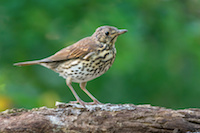 I saw a thrush having lunch the other day.
I saw a thrush having lunch the other day.
Always with thrushes, I can’t tell the difference between male and female – they both wear the same speckled waistcoat, with brown plumage elsewhere, and they always look smart and well-groomed and tidy and dressed-for-dinner.
This one – and I’ll call him a bloke to simplify writing about “somebody” – this one had scored himself a big, round, fat snail, probably after scrabbling through a bunch of leaf-litter and early spring weed growth in the adjacent neighbour’s garden.
I first noticed him when he suddenly flicked into view with a high-speed, leg-racing landing on the lawn just outside my front window. I was, at the time, enjoying a glass of something pleasant and another chapter in a biography of one of my favourite poets, Henry Lawson.
I stopped reading and watched.
Mr Thrush held his catch aloft with a good deal of hungry pride for a few seconds, then hopped across the lawn, over the half-round pine posts that border the driveway, and on to the gap-20 metal of the drive. There he started giving the snail a fair workout.
He battered it mercilessly against one of the larger stones in the driveway, turning his catch first this way then that, tweaking the fragile and gradually-disintegrating snail-shell round and round, and now and then hauling out long, stringy bits of saucy interior.
Not good, if you’re a snail.
But it’s what happens out there in the wilds of a suburban garden, every hour of every day.
I heard the other day that a scientist had carefully calculated that in a certain big patch of native forest in the central North Island, two tonnes of weta were eaten every night by a range of native and introduced critters.
If that’s true – and I have no reason to believe that it isn’t – that’s a lot of die-so-I-may-live action while we are obliviously tucked into warm, comfortable beds.
But back to Mr Thrush …
He hammered that snail into a wreck over about three minutes, peeling off bits of shattered shell as he went and hauling out long strands of what may have been his version of stroganoff, pizza, McSnail and fries, who knows?
It was lunch and he was enjoying it.
As he got through the outer layers of the snail shell, the curls got tighter and tougher, and in consequence were harder to shatter.
In exasperation, Mr Thrush vaulted up onto the half-round pine poles along the driveway edge, and tried them as an anvil. Apparently they didn’t come up to standard, so he impatiently bounced back on to the drive with its less-forgiving stonework.
Bash-bash-bash-bash – tiny fragments of snail shell sparkled and glistened as they were flicked off the disintegrating single-bedroom snail mansion.
I wondered, idly, whether the snail commercial world offered any form of earthquake or nine-eleven war-damage insurance cover. I also wondered whether the snail felt any terror at being eaten alive.
Back to Mr Thrush, again.
Lunch was proceeding well through a number of comfortably-spaced courses. Mr Thrush seemed to decide that his demolition job was sufficient for him to enjoy the inner workings of his excavations as dessert. A section of soft, freshly-mown lawn was obviously a good place to indulge himself in the final fruits of an industrious few minutes. He had constructed a pleasant, tasty, filling mid-day mousse from the very core of the snail shell.
Well – and here’s where the small-time drama happens, right there outside my townie window among the smooth lawns, the daffodils, the pansy bunches, the pruned and budding roses and the pop-up lawn daisies – dessert was abruptly denied Mr Thrush.
Mr Blackbird, quartering a section of lawn nearby, decided he fancied the nub of that juicy snail. From 10 metres away, on the other side of the neighbour’s garden, he pounced with his undertaker all-black, orange-beaked over-weight bully-boy stature.
He won, of course – that’s the stark, harsh, everyday reality of the wild animal kingdom, even if it’s right there, outside our front suburban window. The blackbird was bigger, and more aggressive. Might is right!
Mr Thrush yielded immediately – in the process giving the blackbird what appeared to be the most damning “shove it, mate, and I hope you choke to death” look.
Wildlife, even in our urban gardens, is totally, utterly and absolutely pragmatic. They don’t have recourse to courts of law, or moral judgements from surrounding communal-hug communities. They live on their own, by their wits – or they die. Simple stuff.
So Mr Thrush jerked away from his dessert, leaving it to the bulkier, bullying blackbird. He’d already fed fairly well off the snail – who had probably fed fairly well of the neighbour’s newly-planted cloched lettuces. Mr Blackbird, of course, may have needed the energy provided by the fortuitously-presented McSnail-burger. It may have ensured that his mate, perhaps sitting on an early clutch of eggs, was soon relieved of her home duties and given a chance to feed herself and make her ablutions away from the nest.
So, as is the way of the real world, instead of succulent snail dessert, Mr Thrush was, within seconds, industriously fossicking through the nearby lawn. The misfortune of being robbed was immediately forgotten, and he was dabbing at a minute grub here, snapping up a tiny spider there, probing elsewhere deeply and energetically for a worm or some other subterranean crawlie. He was simply working on the ‘win-some, lose-some’ deal.
And that extraordinary pinhole insight into the world around us shows exactly how wildlife, tiny, small, and massive, understands reality and lives it, all day every day.
I guess it’s that food-chain thing – someone somewhere out there plants 150,000 lettuce seeds; big store buys 100,000 lettuce sproutlings; neighbour buys a dozen junior lettuce and plants them out; snail eats the lettuce; thrush and the blackbird feed off snail; both birds maybe already have sitting hens on early broods of eggs; some horrible Norwegian ship-rat raids one or both nests in the next couple of weeks and the eggs or nestlings will be a pleasant meal for the ravenous rodent; the rat runs foul of a stoat or weasel or hawk or maybe even a household cat; and the sated cat maybe eschews canned tuna for a day, the hawk may haul the rat carcass back to several piping, gaping, gulping, hook-beaked youngsters, and the mustelid may scuttle off again on its blood-thirsty way after briefly slaking its thirst on the aortic blood of the hapless rat.
I’m not sure where it goes from there. But it will and does all happen, today, and tomorrow, and the next day, relentlessly.
Dedicated humans are perfecting specialised methods of killing predator mustelids and feral cats (it ain’t pretty, but it works); if you take out mustelids and cats, which feed frequently and often on rats, you have a rodent problem; mice are the vacuum cleaners of the forest floor, eating nuts, seeds and fresh seedlings, along with a wide range of insects including weta within their designated ranges … the ladder goes up, down and sideways, and the solutions are interwoven and very complex.
I have no idea what the overall answers are.
Meanwhile, especially at this time of year when birds and other wildlife species are obviously involved in the vital business of procreation, life has to continue pulsing along.
Mr Thrush, out on the lawn, cut his losses over the snail and got on with the business of staying alive and perhaps providing for those now depending on him for their future existence. He fossicked and dabbled and scruffled around the lawn and adjacent well-tended flower gardens. Then suddenly he was gone, flicking quickly off into a dense hedge two sections away.
Still there on the lawn, Mr Blackbird strutted about, hunting. He had things to do, and maybe a missus to look after, and perhaps the awareness that an endlessly-hungry family will soon be demanding all his attention.
Yes, I know this is supposed to be an outdoor column. Well, there it is – right outside my urban front window.
Take five, a seat and a glass of something pleasant, and have a look.
Kingsley Field writes a fortnightly Outdoor column in the Waikato Times, and has published two illustrated volumes of the columns. He can be contacted at kingsley(at)accuwrite.co.nz









Join the Discussion
Type out your comment here:
You must be logged in to post a comment.